Organizational Management and Leadership: A Comparative Analysis
VerifiedAdded on 2019/11/20
|12
|2619
|72
Report
AI Summary
This report analyzes three articles exploring the impact of power on leadership and organizational management. The first article examines how executive overconfidence, fueled by power, can lead to poor decision-making, illustrated by cases like BP and a major business integration failure. The second article investigates the relationship between power and loss aversion, suggesting that those in power are less risk-averse and more focused on potential gains. The final article assesses the effects of overconfidence on leadership qualities, such as vision and planning, and its potential to negatively impact organizational effectiveness. The report summarizes each article, compares their findings, and concludes with recommendations for leaders to maintain a balanced level of confidence and avoid the pitfalls of excessive power.
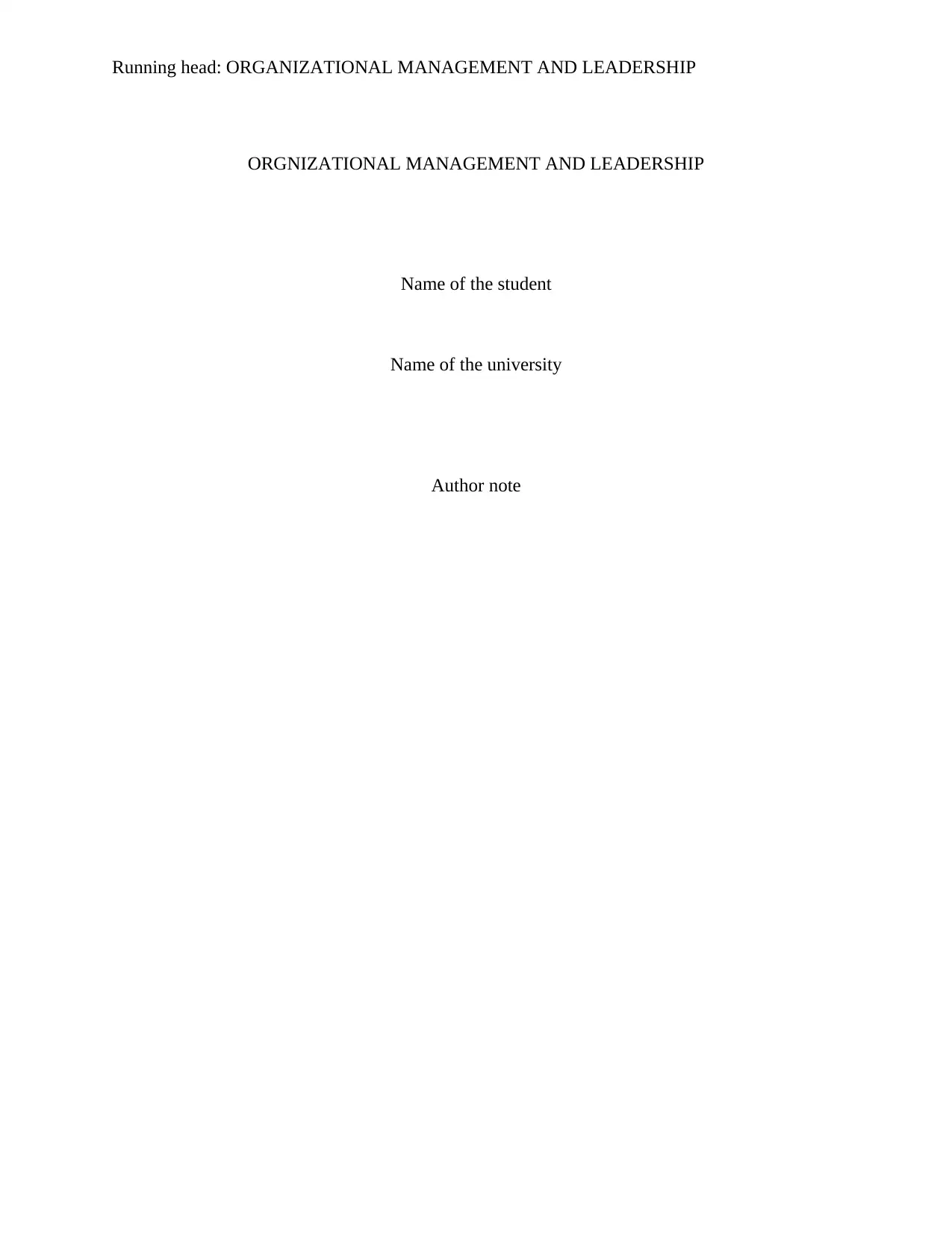
Running head: ORGANIZATIONAL MANAGEMENT AND LEADERSHIP
ORGNIZATIONAL MANAGEMENT AND LEADERSHIP
Name of the student
Name of the university
Author note
ORGNIZATIONAL MANAGEMENT AND LEADERSHIP
Name of the student
Name of the university
Author note
Paraphrase This Document
Need a fresh take? Get an instant paraphrase of this document with our AI Paraphraser
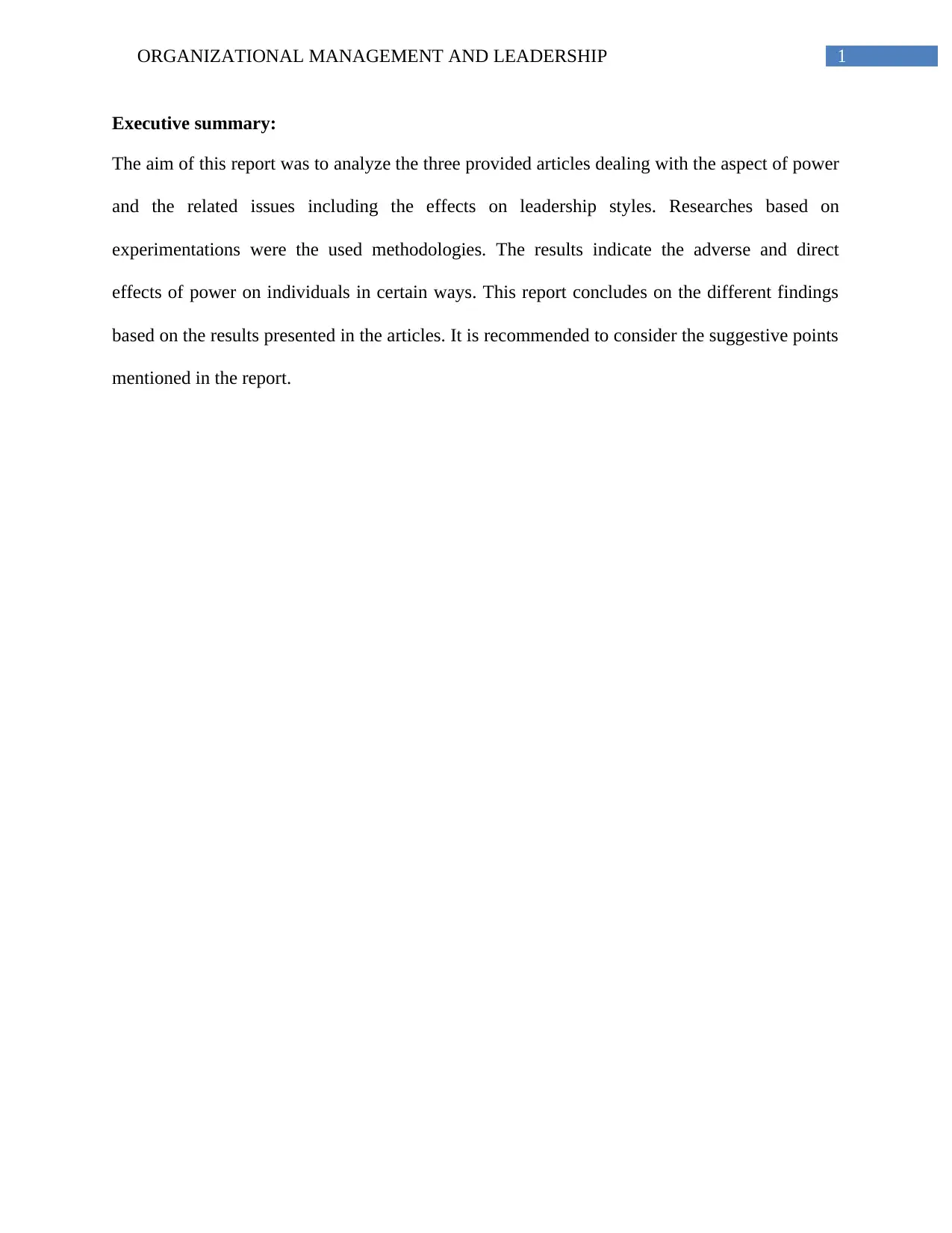
1ORGANIZATIONAL MANAGEMENT AND LEADERSHIP
Executive summary:
The aim of this report was to analyze the three provided articles dealing with the aspect of power
and the related issues including the effects on leadership styles. Researches based on
experimentations were the used methodologies. The results indicate the adverse and direct
effects of power on individuals in certain ways. This report concludes on the different findings
based on the results presented in the articles. It is recommended to consider the suggestive points
mentioned in the report.
Executive summary:
The aim of this report was to analyze the three provided articles dealing with the aspect of power
and the related issues including the effects on leadership styles. Researches based on
experimentations were the used methodologies. The results indicate the adverse and direct
effects of power on individuals in certain ways. This report concludes on the different findings
based on the results presented in the articles. It is recommended to consider the suggestive points
mentioned in the report.
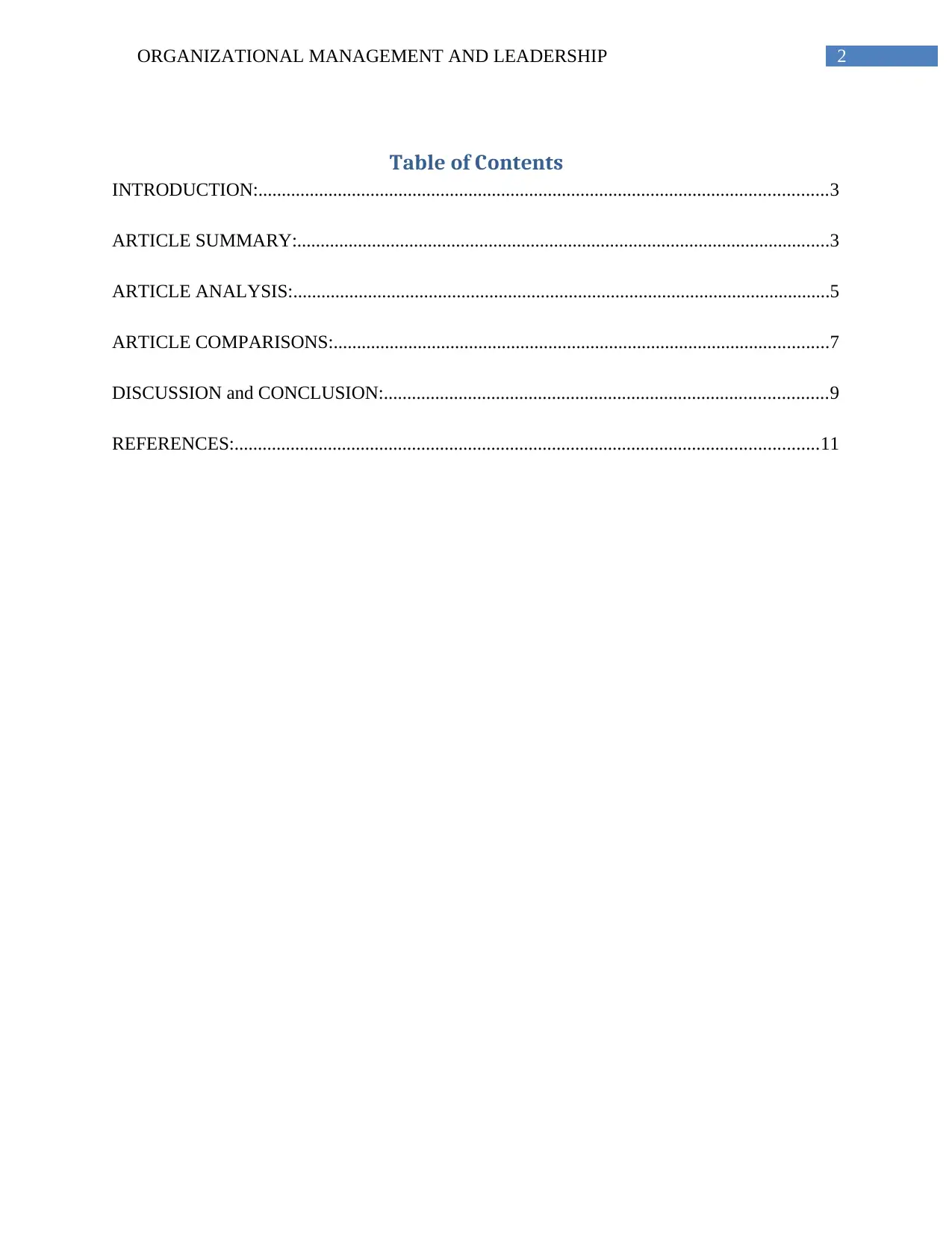
2ORGANIZATIONAL MANAGEMENT AND LEADERSHIP
Table of Contents
INTRODUCTION:..........................................................................................................................3
ARTICLE SUMMARY:..................................................................................................................3
ARTICLE ANALYSIS:...................................................................................................................5
ARTICLE COMPARISONS:..........................................................................................................7
DISCUSSION and CONCLUSION:...............................................................................................9
REFERENCES:.............................................................................................................................11
Table of Contents
INTRODUCTION:..........................................................................................................................3
ARTICLE SUMMARY:..................................................................................................................3
ARTICLE ANALYSIS:...................................................................................................................5
ARTICLE COMPARISONS:..........................................................................................................7
DISCUSSION and CONCLUSION:...............................................................................................9
REFERENCES:.............................................................................................................................11
⊘ This is a preview!⊘
Do you want full access?
Subscribe today to unlock all pages.

Trusted by 1+ million students worldwide
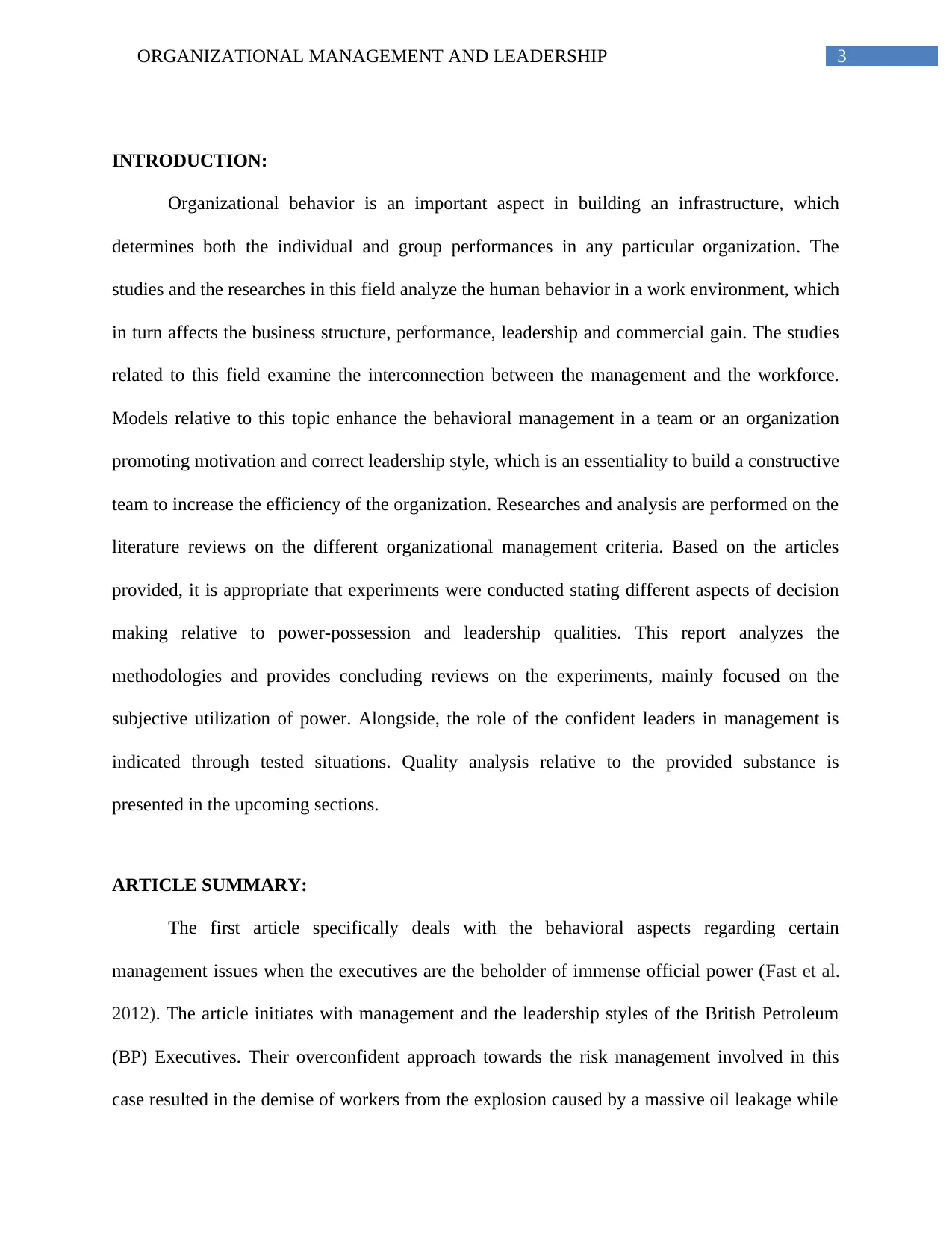
3ORGANIZATIONAL MANAGEMENT AND LEADERSHIP
INTRODUCTION:
Organizational behavior is an important aspect in building an infrastructure, which
determines both the individual and group performances in any particular organization. The
studies and the researches in this field analyze the human behavior in a work environment, which
in turn affects the business structure, performance, leadership and commercial gain. The studies
related to this field examine the interconnection between the management and the workforce.
Models relative to this topic enhance the behavioral management in a team or an organization
promoting motivation and correct leadership style, which is an essentiality to build a constructive
team to increase the efficiency of the organization. Researches and analysis are performed on the
literature reviews on the different organizational management criteria. Based on the articles
provided, it is appropriate that experiments were conducted stating different aspects of decision
making relative to power-possession and leadership qualities. This report analyzes the
methodologies and provides concluding reviews on the experiments, mainly focused on the
subjective utilization of power. Alongside, the role of the confident leaders in management is
indicated through tested situations. Quality analysis relative to the provided substance is
presented in the upcoming sections.
ARTICLE SUMMARY:
The first article specifically deals with the behavioral aspects regarding certain
management issues when the executives are the beholder of immense official power (Fast et al.
2012). The article initiates with management and the leadership styles of the British Petroleum
(BP) Executives. Their overconfident approach towards the risk management involved in this
case resulted in the demise of workers from the explosion caused by a massive oil leakage while
INTRODUCTION:
Organizational behavior is an important aspect in building an infrastructure, which
determines both the individual and group performances in any particular organization. The
studies and the researches in this field analyze the human behavior in a work environment, which
in turn affects the business structure, performance, leadership and commercial gain. The studies
related to this field examine the interconnection between the management and the workforce.
Models relative to this topic enhance the behavioral management in a team or an organization
promoting motivation and correct leadership style, which is an essentiality to build a constructive
team to increase the efficiency of the organization. Researches and analysis are performed on the
literature reviews on the different organizational management criteria. Based on the articles
provided, it is appropriate that experiments were conducted stating different aspects of decision
making relative to power-possession and leadership qualities. This report analyzes the
methodologies and provides concluding reviews on the experiments, mainly focused on the
subjective utilization of power. Alongside, the role of the confident leaders in management is
indicated through tested situations. Quality analysis relative to the provided substance is
presented in the upcoming sections.
ARTICLE SUMMARY:
The first article specifically deals with the behavioral aspects regarding certain
management issues when the executives are the beholder of immense official power (Fast et al.
2012). The article initiates with management and the leadership styles of the British Petroleum
(BP) Executives. Their overconfident approach towards the risk management involved in this
case resulted in the demise of workers from the explosion caused by a massive oil leakage while
Paraphrase This Document
Need a fresh take? Get an instant paraphrase of this document with our AI Paraphraser
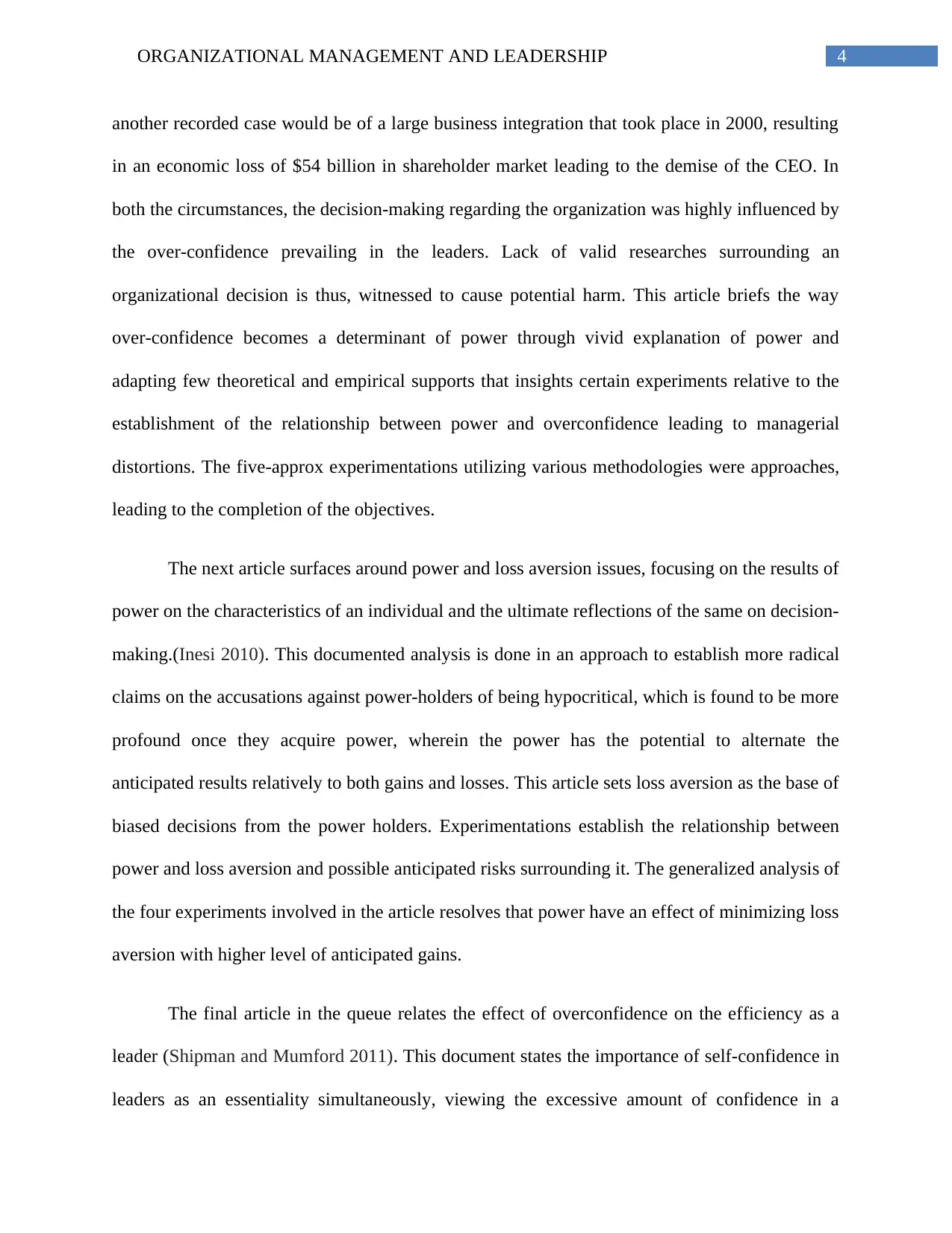
4ORGANIZATIONAL MANAGEMENT AND LEADERSHIP
another recorded case would be of a large business integration that took place in 2000, resulting
in an economic loss of $54 billion in shareholder market leading to the demise of the CEO. In
both the circumstances, the decision-making regarding the organization was highly influenced by
the over-confidence prevailing in the leaders. Lack of valid researches surrounding an
organizational decision is thus, witnessed to cause potential harm. This article briefs the way
over-confidence becomes a determinant of power through vivid explanation of power and
adapting few theoretical and empirical supports that insights certain experiments relative to the
establishment of the relationship between power and overconfidence leading to managerial
distortions. The five-approx experimentations utilizing various methodologies were approaches,
leading to the completion of the objectives.
The next article surfaces around power and loss aversion issues, focusing on the results of
power on the characteristics of an individual and the ultimate reflections of the same on decision-
making.(Inesi 2010). This documented analysis is done in an approach to establish more radical
claims on the accusations against power-holders of being hypocritical, which is found to be more
profound once they acquire power, wherein the power has the potential to alternate the
anticipated results relatively to both gains and losses. This article sets loss aversion as the base of
biased decisions from the power holders. Experimentations establish the relationship between
power and loss aversion and possible anticipated risks surrounding it. The generalized analysis of
the four experiments involved in the article resolves that power have an effect of minimizing loss
aversion with higher level of anticipated gains.
The final article in the queue relates the effect of overconfidence on the efficiency as a
leader (Shipman and Mumford 2011). This document states the importance of self-confidence in
leaders as an essentiality simultaneously, viewing the excessive amount of confidence in a
another recorded case would be of a large business integration that took place in 2000, resulting
in an economic loss of $54 billion in shareholder market leading to the demise of the CEO. In
both the circumstances, the decision-making regarding the organization was highly influenced by
the over-confidence prevailing in the leaders. Lack of valid researches surrounding an
organizational decision is thus, witnessed to cause potential harm. This article briefs the way
over-confidence becomes a determinant of power through vivid explanation of power and
adapting few theoretical and empirical supports that insights certain experiments relative to the
establishment of the relationship between power and overconfidence leading to managerial
distortions. The five-approx experimentations utilizing various methodologies were approaches,
leading to the completion of the objectives.
The next article surfaces around power and loss aversion issues, focusing on the results of
power on the characteristics of an individual and the ultimate reflections of the same on decision-
making.(Inesi 2010). This documented analysis is done in an approach to establish more radical
claims on the accusations against power-holders of being hypocritical, which is found to be more
profound once they acquire power, wherein the power has the potential to alternate the
anticipated results relatively to both gains and losses. This article sets loss aversion as the base of
biased decisions from the power holders. Experimentations establish the relationship between
power and loss aversion and possible anticipated risks surrounding it. The generalized analysis of
the four experiments involved in the article resolves that power have an effect of minimizing loss
aversion with higher level of anticipated gains.
The final article in the queue relates the effect of overconfidence on the efficiency as a
leader (Shipman and Mumford 2011). This document states the importance of self-confidence in
leaders as an essentiality simultaneously, viewing the excessive amount of confidence in a
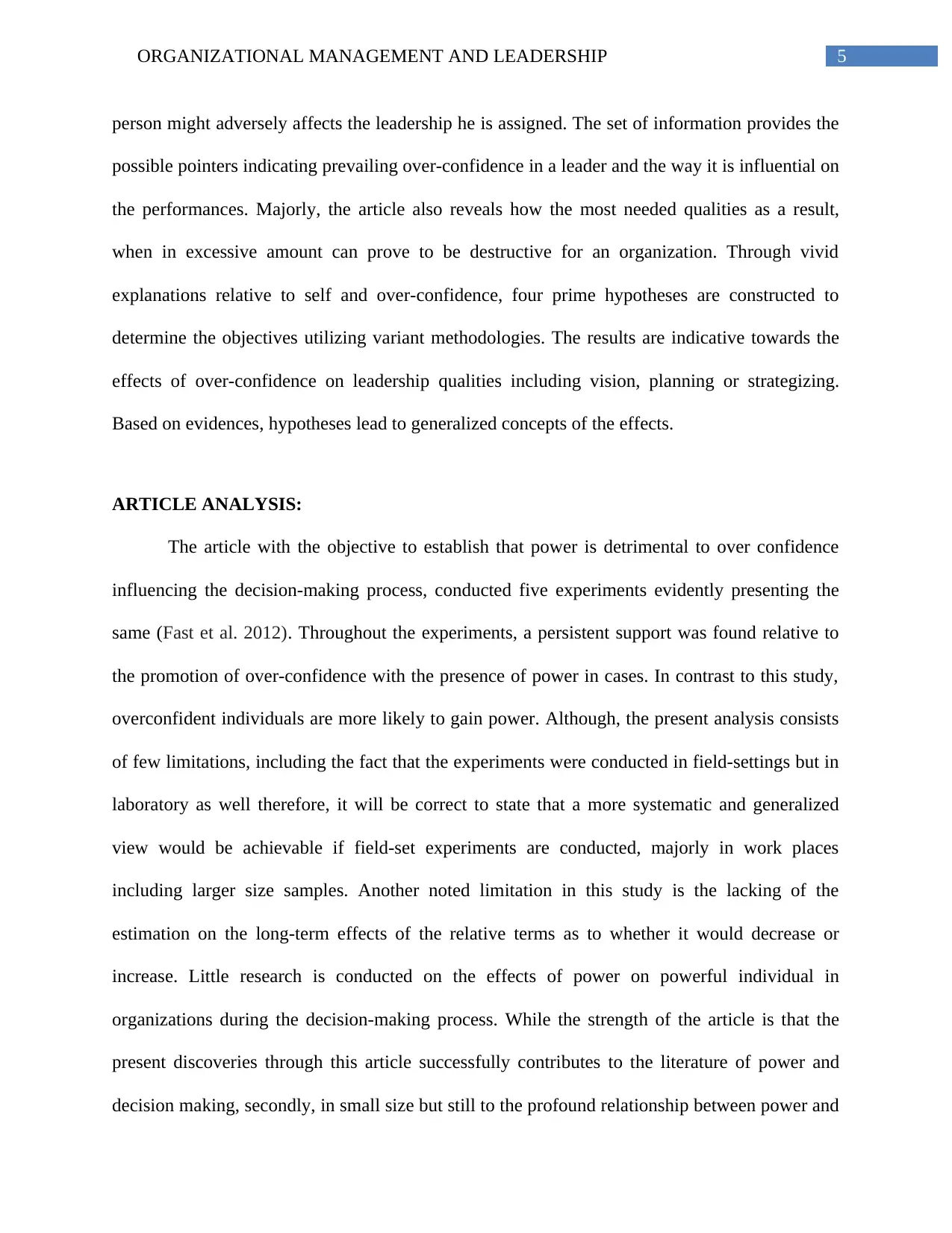
5ORGANIZATIONAL MANAGEMENT AND LEADERSHIP
person might adversely affects the leadership he is assigned. The set of information provides the
possible pointers indicating prevailing over-confidence in a leader and the way it is influential on
the performances. Majorly, the article also reveals how the most needed qualities as a result,
when in excessive amount can prove to be destructive for an organization. Through vivid
explanations relative to self and over-confidence, four prime hypotheses are constructed to
determine the objectives utilizing variant methodologies. The results are indicative towards the
effects of over-confidence on leadership qualities including vision, planning or strategizing.
Based on evidences, hypotheses lead to generalized concepts of the effects.
ARTICLE ANALYSIS:
The article with the objective to establish that power is detrimental to over confidence
influencing the decision-making process, conducted five experiments evidently presenting the
same (Fast et al. 2012). Throughout the experiments, a persistent support was found relative to
the promotion of over-confidence with the presence of power in cases. In contrast to this study,
overconfident individuals are more likely to gain power. Although, the present analysis consists
of few limitations, including the fact that the experiments were conducted in field-settings but in
laboratory as well therefore, it will be correct to state that a more systematic and generalized
view would be achievable if field-set experiments are conducted, majorly in work places
including larger size samples. Another noted limitation in this study is the lacking of the
estimation on the long-term effects of the relative terms as to whether it would decrease or
increase. Little research is conducted on the effects of power on powerful individual in
organizations during the decision-making process. While the strength of the article is that the
present discoveries through this article successfully contributes to the literature of power and
decision making, secondly, in small size but still to the profound relationship between power and
person might adversely affects the leadership he is assigned. The set of information provides the
possible pointers indicating prevailing over-confidence in a leader and the way it is influential on
the performances. Majorly, the article also reveals how the most needed qualities as a result,
when in excessive amount can prove to be destructive for an organization. Through vivid
explanations relative to self and over-confidence, four prime hypotheses are constructed to
determine the objectives utilizing variant methodologies. The results are indicative towards the
effects of over-confidence on leadership qualities including vision, planning or strategizing.
Based on evidences, hypotheses lead to generalized concepts of the effects.
ARTICLE ANALYSIS:
The article with the objective to establish that power is detrimental to over confidence
influencing the decision-making process, conducted five experiments evidently presenting the
same (Fast et al. 2012). Throughout the experiments, a persistent support was found relative to
the promotion of over-confidence with the presence of power in cases. In contrast to this study,
overconfident individuals are more likely to gain power. Although, the present analysis consists
of few limitations, including the fact that the experiments were conducted in field-settings but in
laboratory as well therefore, it will be correct to state that a more systematic and generalized
view would be achievable if field-set experiments are conducted, majorly in work places
including larger size samples. Another noted limitation in this study is the lacking of the
estimation on the long-term effects of the relative terms as to whether it would decrease or
increase. Little research is conducted on the effects of power on powerful individual in
organizations during the decision-making process. While the strength of the article is that the
present discoveries through this article successfully contributes to the literature of power and
decision making, secondly, in small size but still to the profound relationship between power and
⊘ This is a preview!⊘
Do you want full access?
Subscribe today to unlock all pages.

Trusted by 1+ million students worldwide
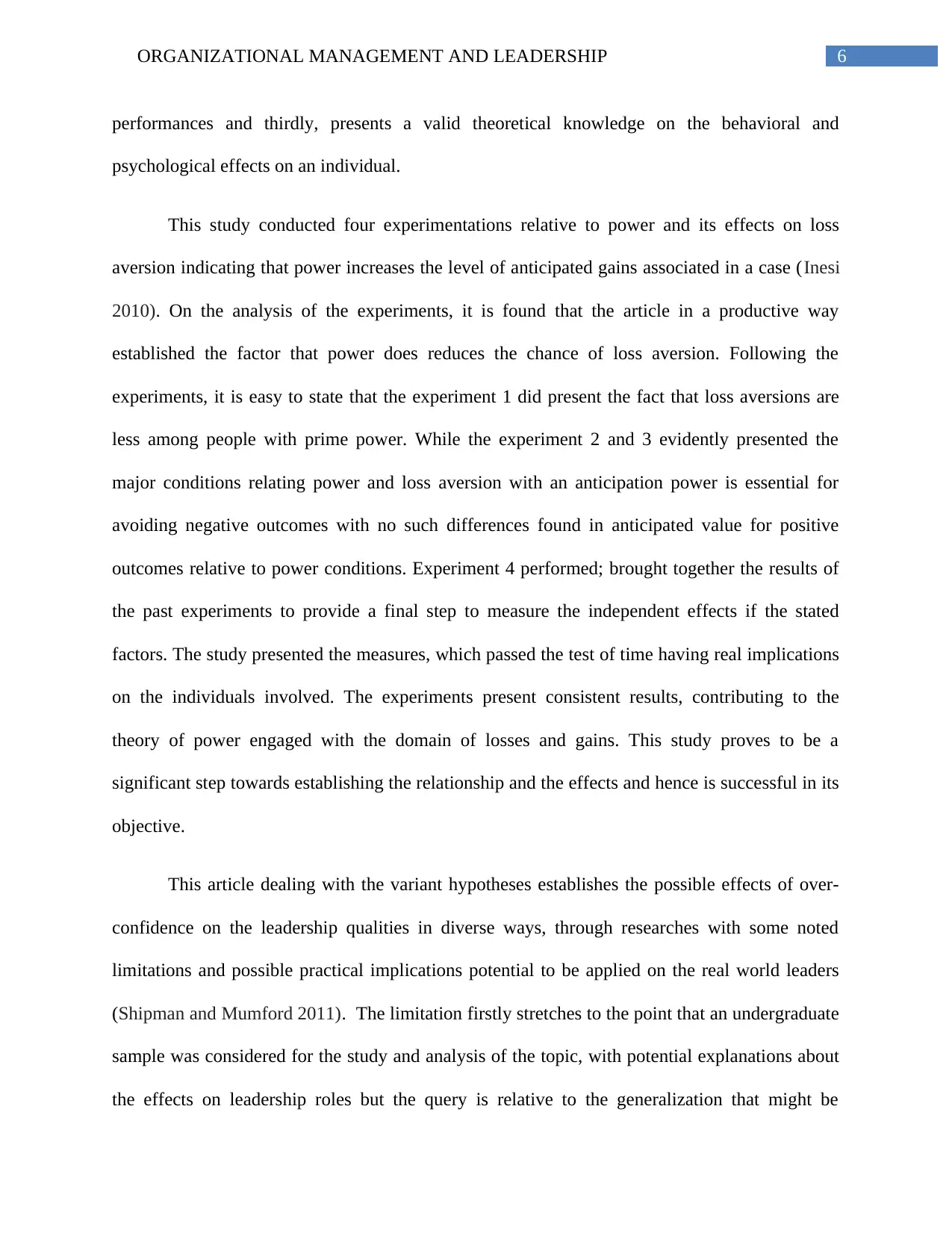
6ORGANIZATIONAL MANAGEMENT AND LEADERSHIP
performances and thirdly, presents a valid theoretical knowledge on the behavioral and
psychological effects on an individual.
This study conducted four experimentations relative to power and its effects on loss
aversion indicating that power increases the level of anticipated gains associated in a case (Inesi
2010). On the analysis of the experiments, it is found that the article in a productive way
established the factor that power does reduces the chance of loss aversion. Following the
experiments, it is easy to state that the experiment 1 did present the fact that loss aversions are
less among people with prime power. While the experiment 2 and 3 evidently presented the
major conditions relating power and loss aversion with an anticipation power is essential for
avoiding negative outcomes with no such differences found in anticipated value for positive
outcomes relative to power conditions. Experiment 4 performed; brought together the results of
the past experiments to provide a final step to measure the independent effects if the stated
factors. The study presented the measures, which passed the test of time having real implications
on the individuals involved. The experiments present consistent results, contributing to the
theory of power engaged with the domain of losses and gains. This study proves to be a
significant step towards establishing the relationship and the effects and hence is successful in its
objective.
This article dealing with the variant hypotheses establishes the possible effects of over-
confidence on the leadership qualities in diverse ways, through researches with some noted
limitations and possible practical implications potential to be applied on the real world leaders
(Shipman and Mumford 2011). The limitation firstly stretches to the point that an undergraduate
sample was considered for the study and analysis of the topic, with potential explanations about
the effects on leadership roles but the query is relative to the generalization that might be
performances and thirdly, presents a valid theoretical knowledge on the behavioral and
psychological effects on an individual.
This study conducted four experimentations relative to power and its effects on loss
aversion indicating that power increases the level of anticipated gains associated in a case (Inesi
2010). On the analysis of the experiments, it is found that the article in a productive way
established the factor that power does reduces the chance of loss aversion. Following the
experiments, it is easy to state that the experiment 1 did present the fact that loss aversions are
less among people with prime power. While the experiment 2 and 3 evidently presented the
major conditions relating power and loss aversion with an anticipation power is essential for
avoiding negative outcomes with no such differences found in anticipated value for positive
outcomes relative to power conditions. Experiment 4 performed; brought together the results of
the past experiments to provide a final step to measure the independent effects if the stated
factors. The study presented the measures, which passed the test of time having real implications
on the individuals involved. The experiments present consistent results, contributing to the
theory of power engaged with the domain of losses and gains. This study proves to be a
significant step towards establishing the relationship and the effects and hence is successful in its
objective.
This article dealing with the variant hypotheses establishes the possible effects of over-
confidence on the leadership qualities in diverse ways, through researches with some noted
limitations and possible practical implications potential to be applied on the real world leaders
(Shipman and Mumford 2011). The limitation firstly stretches to the point that an undergraduate
sample was considered for the study and analysis of the topic, with potential explanations about
the effects on leadership roles but the query is relative to the generalization that might be
Paraphrase This Document
Need a fresh take? Get an instant paraphrase of this document with our AI Paraphraser
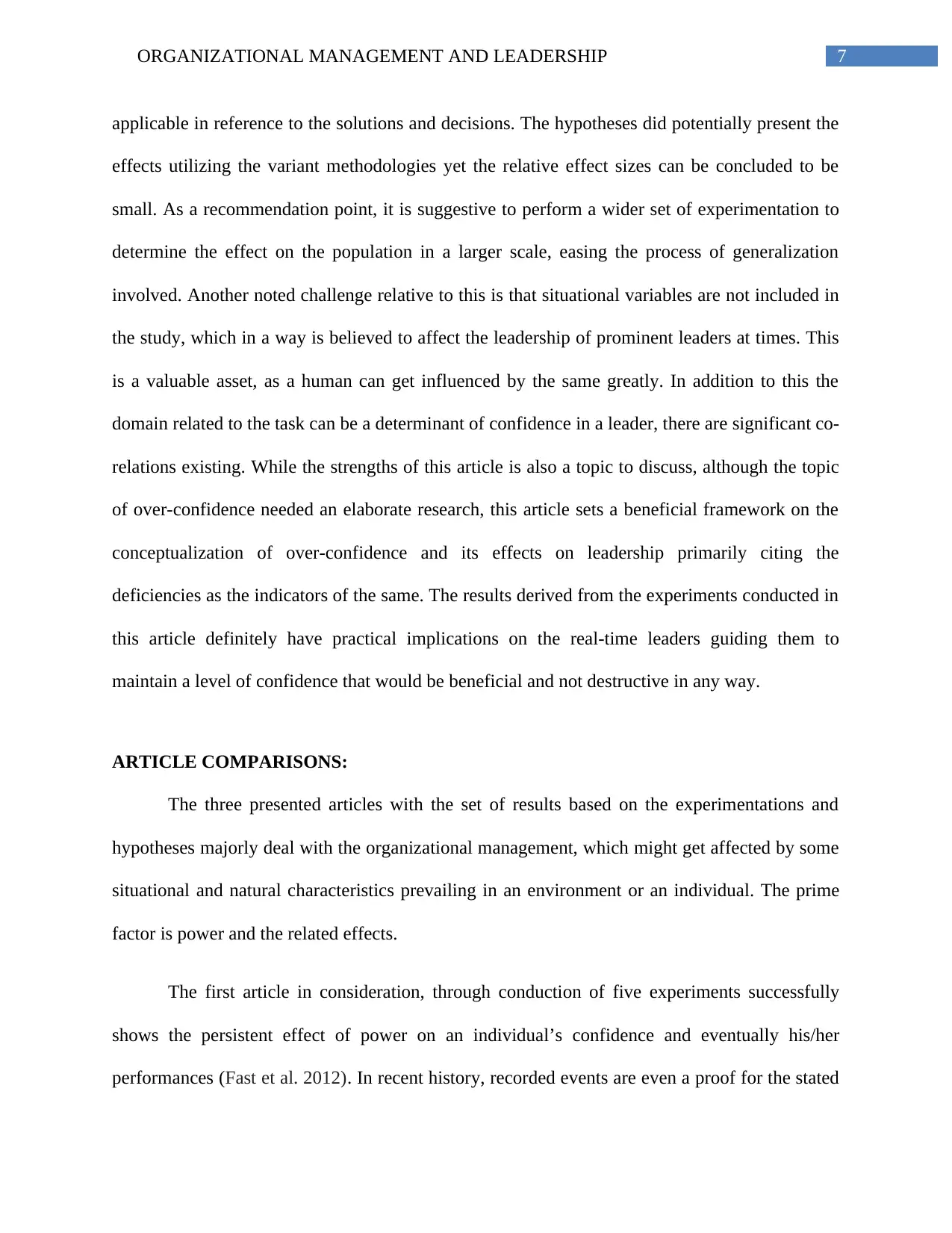
7ORGANIZATIONAL MANAGEMENT AND LEADERSHIP
applicable in reference to the solutions and decisions. The hypotheses did potentially present the
effects utilizing the variant methodologies yet the relative effect sizes can be concluded to be
small. As a recommendation point, it is suggestive to perform a wider set of experimentation to
determine the effect on the population in a larger scale, easing the process of generalization
involved. Another noted challenge relative to this is that situational variables are not included in
the study, which in a way is believed to affect the leadership of prominent leaders at times. This
is a valuable asset, as a human can get influenced by the same greatly. In addition to this the
domain related to the task can be a determinant of confidence in a leader, there are significant co-
relations existing. While the strengths of this article is also a topic to discuss, although the topic
of over-confidence needed an elaborate research, this article sets a beneficial framework on the
conceptualization of over-confidence and its effects on leadership primarily citing the
deficiencies as the indicators of the same. The results derived from the experiments conducted in
this article definitely have practical implications on the real-time leaders guiding them to
maintain a level of confidence that would be beneficial and not destructive in any way.
ARTICLE COMPARISONS:
The three presented articles with the set of results based on the experimentations and
hypotheses majorly deal with the organizational management, which might get affected by some
situational and natural characteristics prevailing in an environment or an individual. The prime
factor is power and the related effects.
The first article in consideration, through conduction of five experiments successfully
shows the persistent effect of power on an individual’s confidence and eventually his/her
performances (Fast et al. 2012). In recent history, recorded events are even a proof for the stated
applicable in reference to the solutions and decisions. The hypotheses did potentially present the
effects utilizing the variant methodologies yet the relative effect sizes can be concluded to be
small. As a recommendation point, it is suggestive to perform a wider set of experimentation to
determine the effect on the population in a larger scale, easing the process of generalization
involved. Another noted challenge relative to this is that situational variables are not included in
the study, which in a way is believed to affect the leadership of prominent leaders at times. This
is a valuable asset, as a human can get influenced by the same greatly. In addition to this the
domain related to the task can be a determinant of confidence in a leader, there are significant co-
relations existing. While the strengths of this article is also a topic to discuss, although the topic
of over-confidence needed an elaborate research, this article sets a beneficial framework on the
conceptualization of over-confidence and its effects on leadership primarily citing the
deficiencies as the indicators of the same. The results derived from the experiments conducted in
this article definitely have practical implications on the real-time leaders guiding them to
maintain a level of confidence that would be beneficial and not destructive in any way.
ARTICLE COMPARISONS:
The three presented articles with the set of results based on the experimentations and
hypotheses majorly deal with the organizational management, which might get affected by some
situational and natural characteristics prevailing in an environment or an individual. The prime
factor is power and the related effects.
The first article in consideration, through conduction of five experiments successfully
shows the persistent effect of power on an individual’s confidence and eventually his/her
performances (Fast et al. 2012). In recent history, recorded events are even a proof for the stated
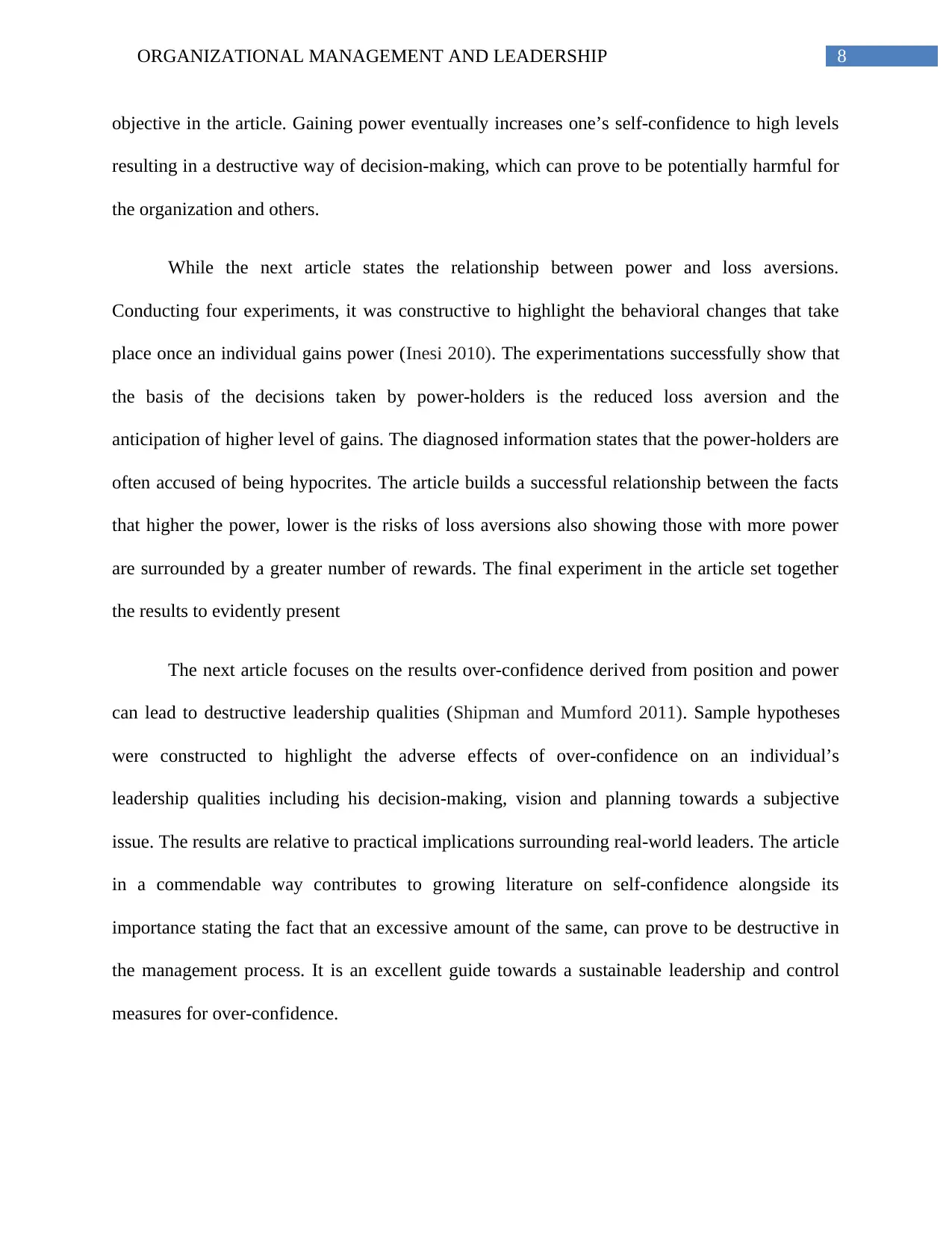
8ORGANIZATIONAL MANAGEMENT AND LEADERSHIP
objective in the article. Gaining power eventually increases one’s self-confidence to high levels
resulting in a destructive way of decision-making, which can prove to be potentially harmful for
the organization and others.
While the next article states the relationship between power and loss aversions.
Conducting four experiments, it was constructive to highlight the behavioral changes that take
place once an individual gains power (Inesi 2010). The experimentations successfully show that
the basis of the decisions taken by power-holders is the reduced loss aversion and the
anticipation of higher level of gains. The diagnosed information states that the power-holders are
often accused of being hypocrites. The article builds a successful relationship between the facts
that higher the power, lower is the risks of loss aversions also showing those with more power
are surrounded by a greater number of rewards. The final experiment in the article set together
the results to evidently present
The next article focuses on the results over-confidence derived from position and power
can lead to destructive leadership qualities (Shipman and Mumford 2011). Sample hypotheses
were constructed to highlight the adverse effects of over-confidence on an individual’s
leadership qualities including his decision-making, vision and planning towards a subjective
issue. The results are relative to practical implications surrounding real-world leaders. The article
in a commendable way contributes to growing literature on self-confidence alongside its
importance stating the fact that an excessive amount of the same, can prove to be destructive in
the management process. It is an excellent guide towards a sustainable leadership and control
measures for over-confidence.
objective in the article. Gaining power eventually increases one’s self-confidence to high levels
resulting in a destructive way of decision-making, which can prove to be potentially harmful for
the organization and others.
While the next article states the relationship between power and loss aversions.
Conducting four experiments, it was constructive to highlight the behavioral changes that take
place once an individual gains power (Inesi 2010). The experimentations successfully show that
the basis of the decisions taken by power-holders is the reduced loss aversion and the
anticipation of higher level of gains. The diagnosed information states that the power-holders are
often accused of being hypocrites. The article builds a successful relationship between the facts
that higher the power, lower is the risks of loss aversions also showing those with more power
are surrounded by a greater number of rewards. The final experiment in the article set together
the results to evidently present
The next article focuses on the results over-confidence derived from position and power
can lead to destructive leadership qualities (Shipman and Mumford 2011). Sample hypotheses
were constructed to highlight the adverse effects of over-confidence on an individual’s
leadership qualities including his decision-making, vision and planning towards a subjective
issue. The results are relative to practical implications surrounding real-world leaders. The article
in a commendable way contributes to growing literature on self-confidence alongside its
importance stating the fact that an excessive amount of the same, can prove to be destructive in
the management process. It is an excellent guide towards a sustainable leadership and control
measures for over-confidence.
⊘ This is a preview!⊘
Do you want full access?
Subscribe today to unlock all pages.

Trusted by 1+ million students worldwide
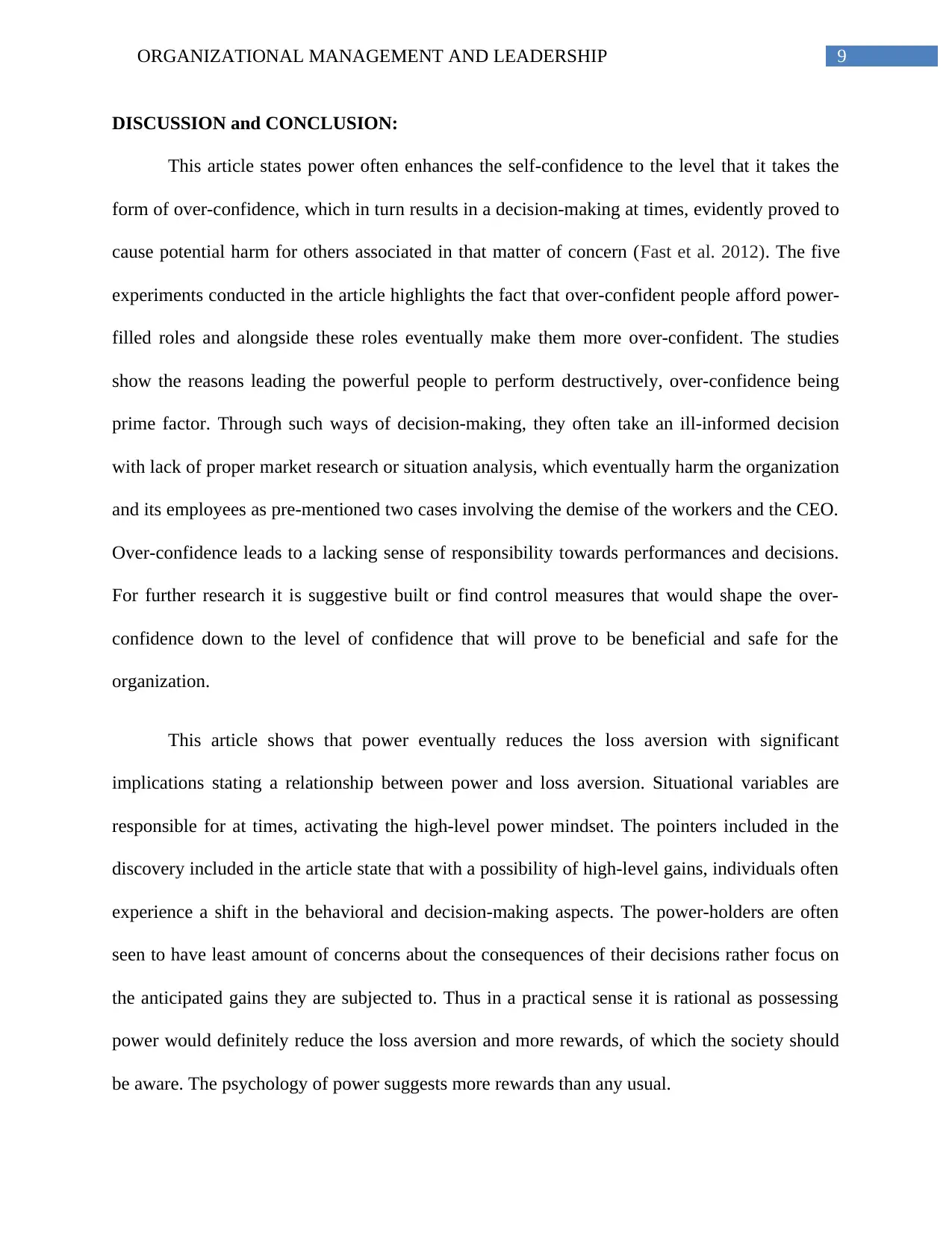
9ORGANIZATIONAL MANAGEMENT AND LEADERSHIP
DISCUSSION and CONCLUSION:
This article states power often enhances the self-confidence to the level that it takes the
form of over-confidence, which in turn results in a decision-making at times, evidently proved to
cause potential harm for others associated in that matter of concern (Fast et al. 2012). The five
experiments conducted in the article highlights the fact that over-confident people afford power-
filled roles and alongside these roles eventually make them more over-confident. The studies
show the reasons leading the powerful people to perform destructively, over-confidence being
prime factor. Through such ways of decision-making, they often take an ill-informed decision
with lack of proper market research or situation analysis, which eventually harm the organization
and its employees as pre-mentioned two cases involving the demise of the workers and the CEO.
Over-confidence leads to a lacking sense of responsibility towards performances and decisions.
For further research it is suggestive built or find control measures that would shape the over-
confidence down to the level of confidence that will prove to be beneficial and safe for the
organization.
This article shows that power eventually reduces the loss aversion with significant
implications stating a relationship between power and loss aversion. Situational variables are
responsible for at times, activating the high-level power mindset. The pointers included in the
discovery included in the article state that with a possibility of high-level gains, individuals often
experience a shift in the behavioral and decision-making aspects. The power-holders are often
seen to have least amount of concerns about the consequences of their decisions rather focus on
the anticipated gains they are subjected to. Thus in a practical sense it is rational as possessing
power would definitely reduce the loss aversion and more rewards, of which the society should
be aware. The psychology of power suggests more rewards than any usual.
DISCUSSION and CONCLUSION:
This article states power often enhances the self-confidence to the level that it takes the
form of over-confidence, which in turn results in a decision-making at times, evidently proved to
cause potential harm for others associated in that matter of concern (Fast et al. 2012). The five
experiments conducted in the article highlights the fact that over-confident people afford power-
filled roles and alongside these roles eventually make them more over-confident. The studies
show the reasons leading the powerful people to perform destructively, over-confidence being
prime factor. Through such ways of decision-making, they often take an ill-informed decision
with lack of proper market research or situation analysis, which eventually harm the organization
and its employees as pre-mentioned two cases involving the demise of the workers and the CEO.
Over-confidence leads to a lacking sense of responsibility towards performances and decisions.
For further research it is suggestive built or find control measures that would shape the over-
confidence down to the level of confidence that will prove to be beneficial and safe for the
organization.
This article shows that power eventually reduces the loss aversion with significant
implications stating a relationship between power and loss aversion. Situational variables are
responsible for at times, activating the high-level power mindset. The pointers included in the
discovery included in the article state that with a possibility of high-level gains, individuals often
experience a shift in the behavioral and decision-making aspects. The power-holders are often
seen to have least amount of concerns about the consequences of their decisions rather focus on
the anticipated gains they are subjected to. Thus in a practical sense it is rational as possessing
power would definitely reduce the loss aversion and more rewards, of which the society should
be aware. The psychology of power suggests more rewards than any usual.
Paraphrase This Document
Need a fresh take? Get an instant paraphrase of this document with our AI Paraphraser
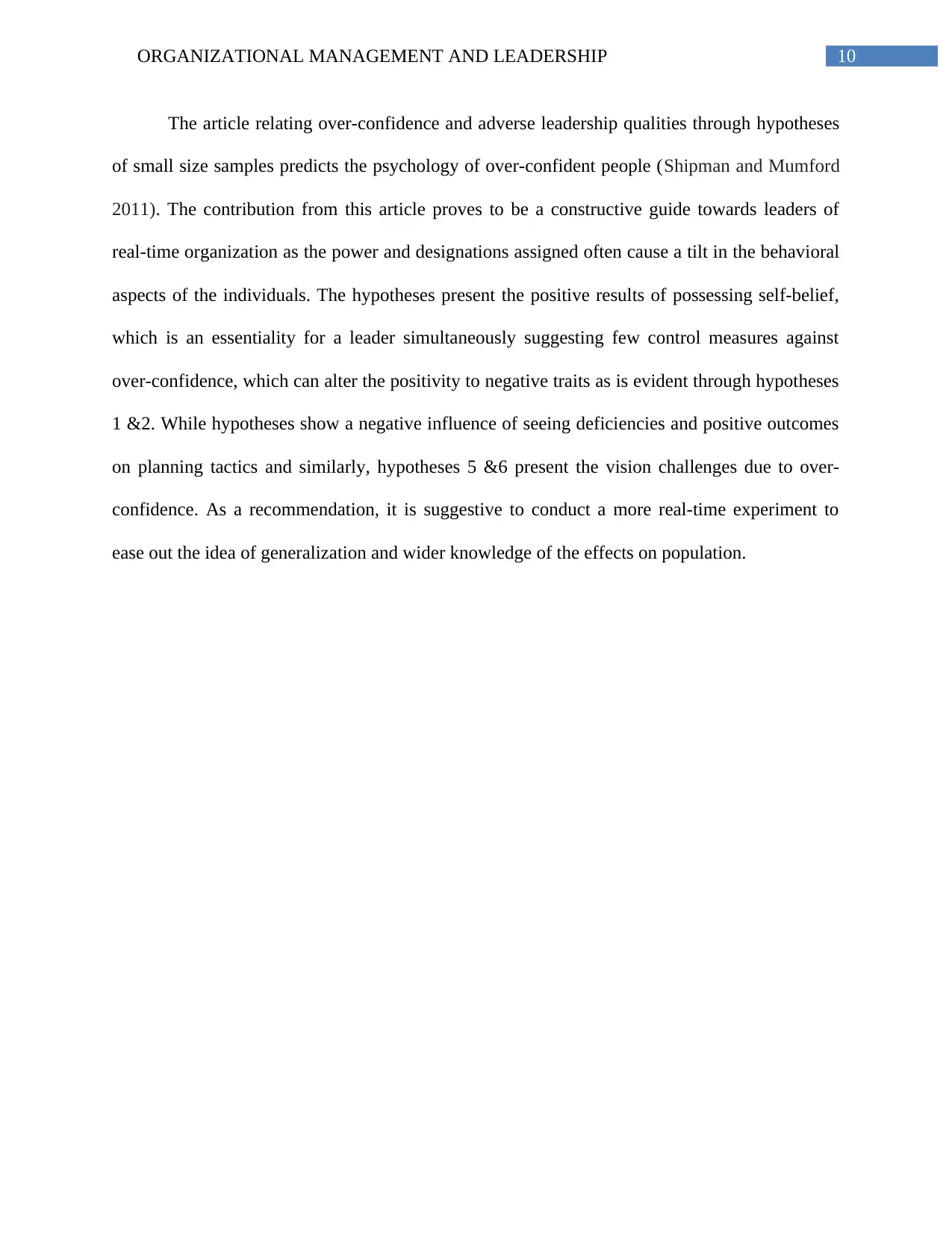
10ORGANIZATIONAL MANAGEMENT AND LEADERSHIP
The article relating over-confidence and adverse leadership qualities through hypotheses
of small size samples predicts the psychology of over-confident people (Shipman and Mumford
2011). The contribution from this article proves to be a constructive guide towards leaders of
real-time organization as the power and designations assigned often cause a tilt in the behavioral
aspects of the individuals. The hypotheses present the positive results of possessing self-belief,
which is an essentiality for a leader simultaneously suggesting few control measures against
over-confidence, which can alter the positivity to negative traits as is evident through hypotheses
1 &2. While hypotheses show a negative influence of seeing deficiencies and positive outcomes
on planning tactics and similarly, hypotheses 5 &6 present the vision challenges due to over-
confidence. As a recommendation, it is suggestive to conduct a more real-time experiment to
ease out the idea of generalization and wider knowledge of the effects on population.
The article relating over-confidence and adverse leadership qualities through hypotheses
of small size samples predicts the psychology of over-confident people (Shipman and Mumford
2011). The contribution from this article proves to be a constructive guide towards leaders of
real-time organization as the power and designations assigned often cause a tilt in the behavioral
aspects of the individuals. The hypotheses present the positive results of possessing self-belief,
which is an essentiality for a leader simultaneously suggesting few control measures against
over-confidence, which can alter the positivity to negative traits as is evident through hypotheses
1 &2. While hypotheses show a negative influence of seeing deficiencies and positive outcomes
on planning tactics and similarly, hypotheses 5 &6 present the vision challenges due to over-
confidence. As a recommendation, it is suggestive to conduct a more real-time experiment to
ease out the idea of generalization and wider knowledge of the effects on population.
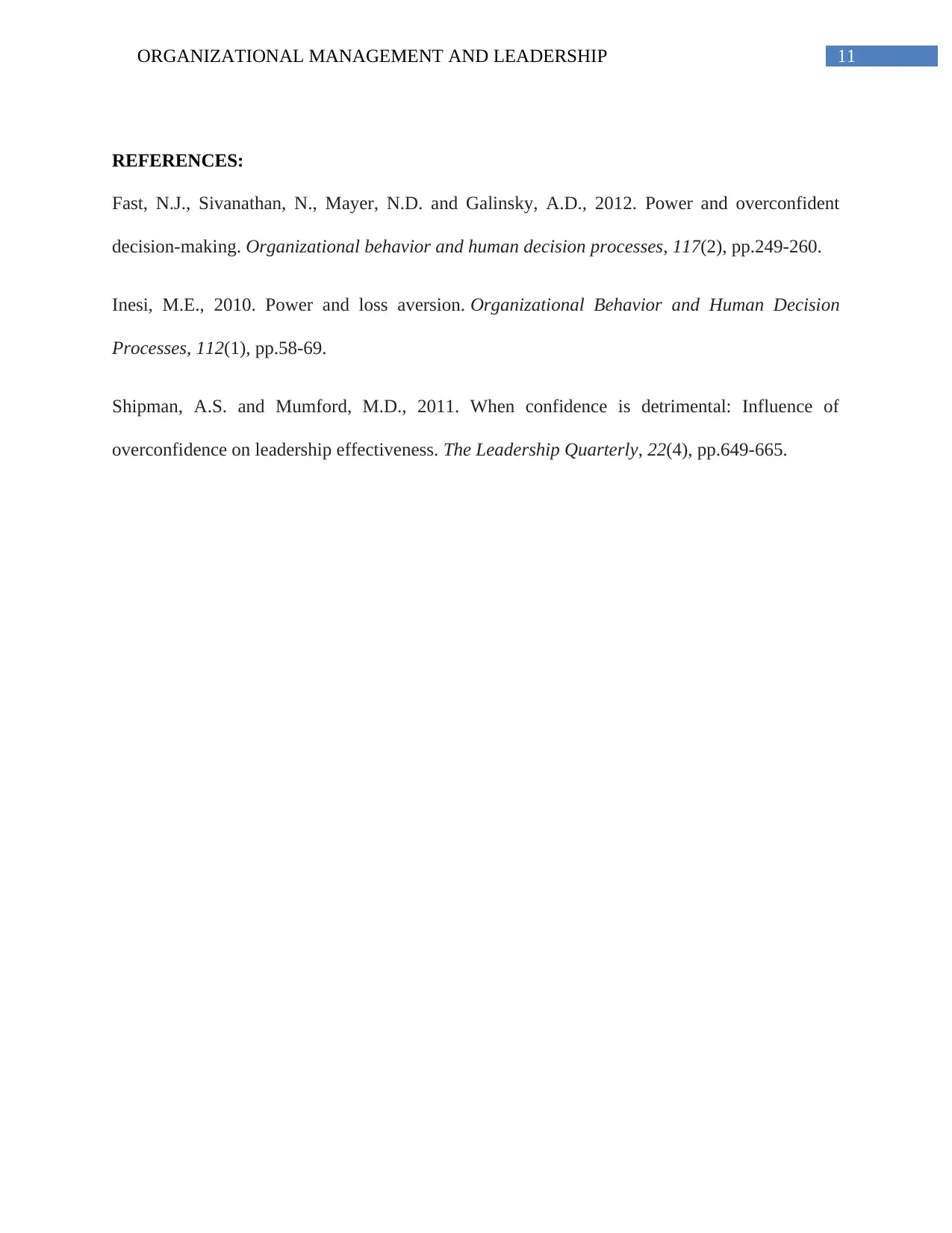
11ORGANIZATIONAL MANAGEMENT AND LEADERSHIP
REFERENCES:
Fast, N.J., Sivanathan, N., Mayer, N.D. and Galinsky, A.D., 2012. Power and overconfident
decision-making. Organizational behavior and human decision processes, 117(2), pp.249-260.
Inesi, M.E., 2010. Power and loss aversion. Organizational Behavior and Human Decision
Processes, 112(1), pp.58-69.
Shipman, A.S. and Mumford, M.D., 2011. When confidence is detrimental: Influence of
overconfidence on leadership effectiveness. The Leadership Quarterly, 22(4), pp.649-665.
REFERENCES:
Fast, N.J., Sivanathan, N., Mayer, N.D. and Galinsky, A.D., 2012. Power and overconfident
decision-making. Organizational behavior and human decision processes, 117(2), pp.249-260.
Inesi, M.E., 2010. Power and loss aversion. Organizational Behavior and Human Decision
Processes, 112(1), pp.58-69.
Shipman, A.S. and Mumford, M.D., 2011. When confidence is detrimental: Influence of
overconfidence on leadership effectiveness. The Leadership Quarterly, 22(4), pp.649-665.
⊘ This is a preview!⊘
Do you want full access?
Subscribe today to unlock all pages.

Trusted by 1+ million students worldwide
1 out of 12
Related Documents
Your All-in-One AI-Powered Toolkit for Academic Success.
+13062052269
info@desklib.com
Available 24*7 on WhatsApp / Email
![[object Object]](/_next/static/media/star-bottom.7253800d.svg)
Unlock your academic potential
Copyright © 2020–2026 A2Z Services. All Rights Reserved. Developed and managed by ZUCOL.




